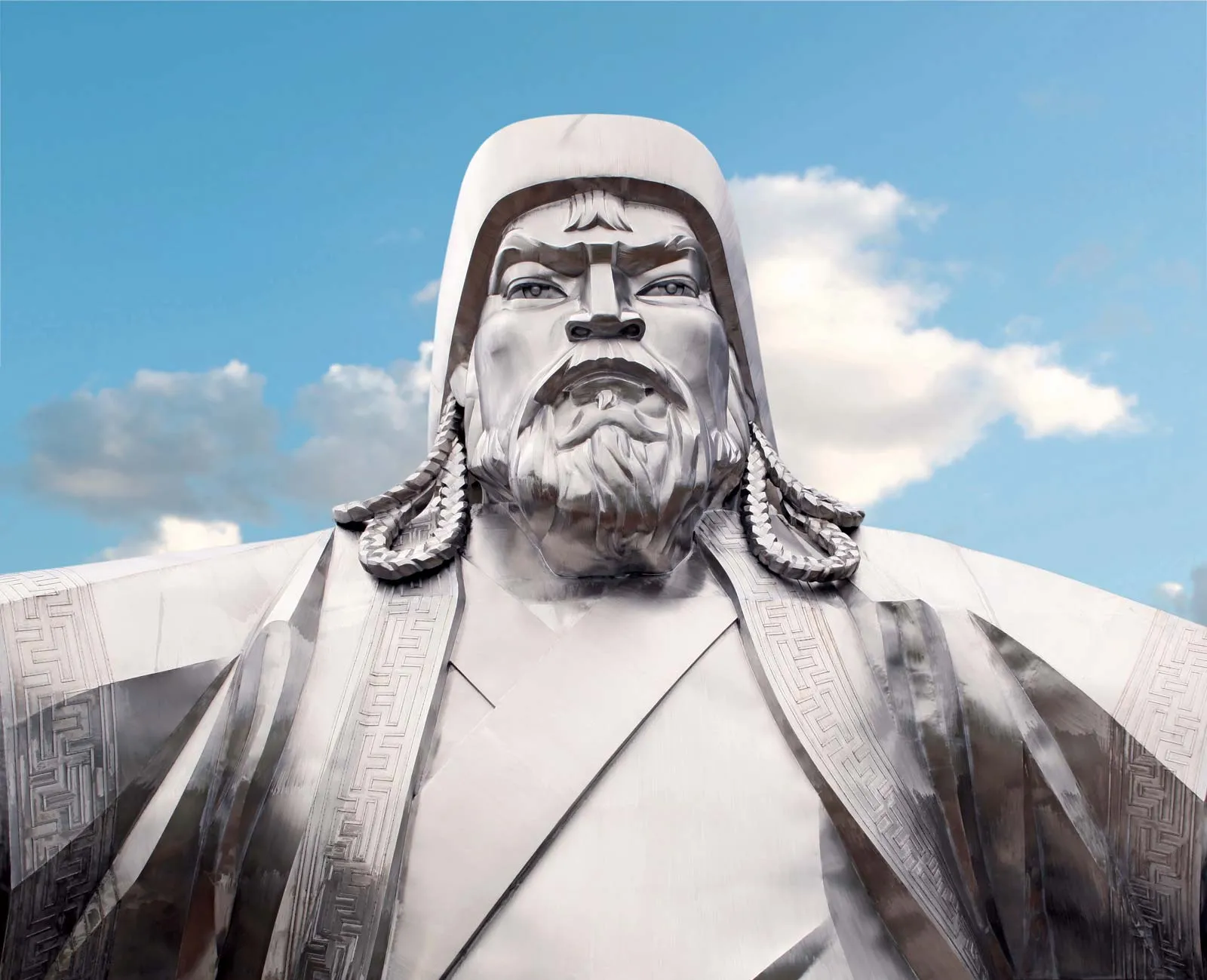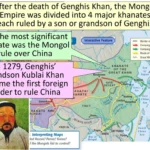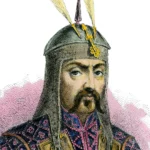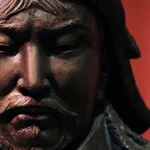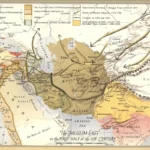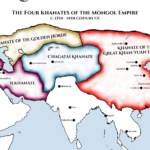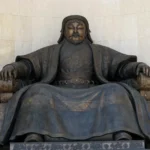Hey there, history buffs! Strap in for a wild ride through the life of Genghis Khan, the ultimate conqueror. This dude was the brains behind the biggest land empire the world had ever seen, back when people rode horses and shot arrows. Get ready to hear about his crazy military skills, smart thinking, and how he totally changed the history game.
Genghis Khan: A Conqueror’s Legacy
Genghis Khan, whose name means “Universal Ruler,” is one of the most influential figures in world history. His military prowess, keen leadership, and sweeping conquests transformed the world map and left an indelible mark on civilization.
A Master of Warfare
Genghis Khan revolutionized military tactics by combining heavy cavalry with horse archers. His swift and devastating campaigns swept across vast territories, creating an empire that stretched from Eastern Europe to the Pacific Ocean. His cavalry tactics, featuring lightning-fast raids and coordinated maneuvers, became the blueprint for future military strategies.
Beyond the Battlefield
Beyond his military might, Genghis Khan was an astute ruler who established a legal code known as the Yassa. This system provided a framework for law and order throughout his empire, ensuring justice for all citizens. He also promoted tolerance and diversity, encouraging trade and cultural exchange along the Silk Road.
Uniting the East and West
Genghis Khan’s conquests inadvertently facilitated commerce and cultural interaction between the East and West. The secure routes created by his empire allowed for the exchange of goods, ideas, and technologies, fostering the spread of knowledge and innovation.
A Legacy That Endures
Genghis Khan’s achievements continue to be studied and admired today. His military tactics are still analyzed by strategists, while his governance practices provide insights into effective leadership. His name is synonymous with power, ambition, and the shaping of human history.
Factors Contributing to Success
Genghis Khan’s remarkable success stemmed from several key factors:
- Charisma and Leadership: He inspired loyalty and obedience among his followers, uniting them into a formidable force.
- Strategic Planning: Genghis Khan carefully planned his campaigns, gathering intelligence and utilizing deception to outsmart opponents.
- Adaptability: He learned from his experiences and adjusted his tactics to overcome challenges.
- Ruthless Diplomacy: He used both force and diplomacy to secure alliances and expand his empire.
- Merit-Based System: Genghis Khan promoted capable individuals based on their skills and loyalty, regardless of their background.
For a captivating history lesson, delve into the Genghis Khan timeline to witness the pivotal events that shaped the Mongol Empire. Explore the extraordinary life and legacy of Genghis Khan and the Mongol Empire, a formidable force that left an indelible mark on world history. Discover the legendary Genghis Khan quotes that capture his profound wisdom and leadership principles. Witness the remarkable military campaigns and Genghis Khan conquests that extended the empire’s reach across vast territories.
Military Innovations that Revolutionized Warfare
The mighty Mongol Empire under Genghis Khan left an indelible mark on warfare, introducing game-changing strategies and tactics that transformed how armies fought. Here’s a deeper dive into the key innovations that propelled the Mongols to conquer vast territories:
Composite Bow and Agile Cavalry
The composite bow was the Mongols’ secret weapon, a lethal tool that could pierce armor from afar. Its superior range and accuracy gave them a decisive edge over their foes.
Combine that with their exceptional horsemanship, and the Mongols became unstoppable on the battlefield. Their cavalry units were lightning-fast, able to outmaneuver opponents, launch surprise attacks, and retreat in an instant. This mobility made them virtually unbeatable, allowing them to conquer vast distances and overcome numerical disparities.
Organization and Discipline
The Mongol army wasn’t just a mob; it was a well-oiled machine. They organized into “tumens” (10,000 troops) and “minghans” (1,000 troops), ensuring clear communication and seamless coordination during intense battles.
Discipline was also a top priority. Mongols followed orders to the letter, which enabled them to execute complex maneuvers with precision. Their unwavering obedience played a crucial role in their battlefield success.
Adaptability and Flexibility
The Mongols were masters of adaptation. They didn’t stick to a rigid strategy but modified their tactics to suit every battlefield situation. They weren’t above using siege warfare to capture fortified cities or employing naval strategies when necessary.
Psychological warfare was another weapon in their arsenal. They spread rumors and used intimidation to demoralize their enemies, making them more vulnerable to defeat.
Key Innovations Summary:
- Composite bows: Extended range, accuracy, and armor-piercing power
- Mobile cavalry: Speed, maneuverability, and surprise tactics
- Organizational structure: Clear communication and coordination on the battlefield
- Discipline: Obedience and efficient maneuver execution
- Adaptability and flexibility: Effective responses to diverse battlefield conditions
Genghis Khan’s military innovations revolutionized warfare and left a lasting legacy on the art of battle. By embracing these advancements, the Mongols became an unstoppable force, conquering vast territories and establishing one of the largest empires in history.
Unifying Mongol Tribes under One Banner
Genghis Khan: The Man Who United the Mongols
Imagine a world where different groups of people lived scattered across a vast and unforgiving land. Imagine these groups always fighting and never getting along. That was the world of the Mongolian tribes before Genghis Khan came along.
Genghis Khan was born into a poor family, but he had a vision. He wanted to unite all the Mongol tribes under one banner and create a powerful empire.
And that’s exactly what he did.
How Genghis Khan United the Mongols
Genghis Khan didn’t just dream about uniting the Mongols. He worked hard to make it happen.
He used a combination of diplomacy and military conquest to bring the tribes together. He also created a centralized government and a legal code to keep the empire organized and running smoothly.
The Benefits of Unity
Uniting the Mongol tribes had many benefits.
- It created a more powerful empire that could defend itself against its enemies.
- It allowed the Mongols to conquer new lands and expand their territory.
- It fostered a sense of unity and cooperation among the Mongol people.
Genghis Khan’s Legacy
Genghis Khan died in 1227, but his legacy lives on. He is remembered as one of the greatest conquerors in history. His empire was the largest land empire ever created.
But Genghis Khan’s legacy is about more than just conquest. He also left a lasting impact on the world through his innovative ideas about government and law.
Timeline of Genghis Khan’s Unification of the Mongol Tribes:
- 1189: Born Temüjin
- 1206: Declared Genghis Khan (Universal Ruler)
- 1211-1221: Conquered northern China
- 1215-1221: Conquered Central Asia
- 1219-1222: Conquered the Persian Empire
- 1223-1224: Campaigned in Afghanistan and India
- 1227: Died
Pros and Cons of Genghis Khan’s Unification
Pros:
- Created a powerful empire that could defend itself against its enemies.
- Allowed the Mongols to conquer new lands and expand their territory.
- Fostered a sense of unity and cooperation among the Mongol people.
Cons:
- Conquest was often bloody and destructive.
- Many people were killed or enslaved during the Mongol conquests.
- The empire was divided after Genghis Khan’s death.
Establishing the Largest Contiguous Land Empire: How Genghis Khan Conquered the World
Genghis Khan, with his unrivaled military genius and keen strategic mind, ascended to the throne and embarked on an epic journey that would shape history forever. His audacious vision was to forge a colossal land empire that had never been seen before.
The Innovations that Reshaped Mongol Warfare
Genghis Khan’s military prowess was not born from sheer numbers but from groundbreaking advancements that transformed the very nature of warfare:
- Composite Bow and Swift Cavalry: The composite bow, with its exceptional range and piercing power, became the Mongols’ secret weapon. Paired with lightning-fast cavalry units, they could launch devastating attacks at a distance and then vanish before enemies could react.
- Organization and Precision: Genghis Khan implemented a structured military system, dividing his army into well-coordinated units. Iron discipline and unwavering obedience kept them aligned and effective even in the thickest of battles.
- Adaptability and Ingenuity: Unlike other conquerors, Genghis Khan possessed a remarkable ability to adapt and innovate. He employed siege machines to breach fortified cities and even ventured into naval warfare to conquer islands. His willingness to embrace new strategies gave him an unstoppable edge.
Forging a United Mongol Nation
Before launching his grand conquests, Genghis Khan faced a formidable challenge: uniting the fractured Mongol tribes. Through savvy diplomacy and strategic alliances, as well as occasional bouts of ruthless warfare, he managed to rally them under his banner, creating a formidable force that would shake the world.
Conquering Vast Territories: A Lightning-Fast Expansion
With his unified army at his command, Genghis Khan set out on a series of lightning-fast campaigns that expanded the Mongol Empire to an astonishing scale. From the vast steppes of Central Asia to the bustling cities of Eastern Europe, his armies conquered vast swaths of territory, stretching from the shores of the Pacific Ocean to the Caspian Sea.
Lessons Learned: The Legacy of Genghis Khan
- The power of innovation: Genghis Khan’s military advancements, such as the composite bow and mobile cavalry, proved to be decisive on the battlefield.
- Importance of organization and discipline: His meticulous planning and strict rules ensured the smooth operation and coordination of his massive army.
- Adaptability and resilience: Genghis Khan’s willingness to learn and adapt to different terrains and challenges made him an unstoppable force.
- Unity and purpose: The unification of the Mongol tribes under one banner fostered a formidable sense of camaraderie and shared ambition.
Genghis Khan’s conquests were a testament to his military genius and his unwavering quest for power. By revolutionizing warfare, uniting his people, and expanding his empire to unprecedented heights, he left an indelible mark on the course of history.
FAQ
Q1: How did Genghis Khan rise from humble beginnings to establish a world-renowned empire?
A1: Genghis Khan’s journey began as Temüjin, the son of a tribal leader. After his father’s untimely demise, he faced adversity and hardship. Through his resilience, strategic alliances, and exceptional leadership, he gradually united the nomadic tribes of the Mongolian steppe, establishing a formidable force that would conquer vast territories.
Q2: What military innovations revolutionized warfare under Genghis Khan’s leadership?
A2: Genghis Khan’s military prowess stemmed from his innovative tactics and strategies. He introduced the composite bow, a powerful weapon that gave his armies a significant advantage in ranged combat. Additionally, he employed highly effective cavalry tactics, utilizing mobility, speed, and discipline to overwhelm his opponents.
Q3: How did Genghis Khan unify the Mongol tribes under one banner?
A3: Genghis Khan’s unifying vision and leadership were instrumental in bringing together the fragmented Mongol tribes. Through a combination of strategic alliances, military conquests, and a merit-based system that replaced traditional tribal hierarchies, he fostered a sense of unity and loyalty among his followers, creating a formidable force that would conquer vast territories.
Q4: What factors contributed to the establishment of the largest contiguous land empire under Genghis Khan’s rule?
A4: The establishment of the largest contiguous land empire under Genghis Khan’s reign can be attributed to a combination of factors. His innovative military strategies, effective governance systems, and diplomatic skills enabled him to conquer and maintain control over vast territories. Additionally, the Pax Mongolica, a period of relative peace and stability during his reign, facilitated trade and cultural exchange, further solidifying his empire.
Q5: What is Genghis Khan’s lasting legacy and impact on world history?
A5: Genghis Khan’s legacy extends far beyond his military conquests. He implemented a merit-based system that transcended traditional tribal hierarchies, fostering a diverse and skilled administration. His empire facilitated trade and cultural exchange along the Silk Road, contributing to the spread of knowledge and ideas between the East and West. Despite his reputation as a ruthless conqueror, his administrative reforms and cultural impact left a lasting mark on history.
- Crypto Quotes’ Red Flags: Avoid Costly Mistakes - June 30, 2025
- Unlock Inspirational Crypto Quotes: Future Predictions - June 30, 2025
- Famous Bitcoin Quotes: A Deep Dive into Crypto’s History - June 30, 2025
